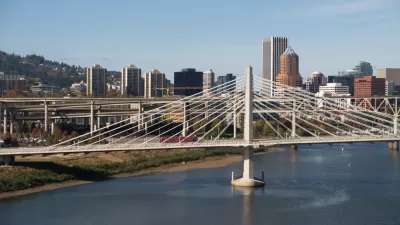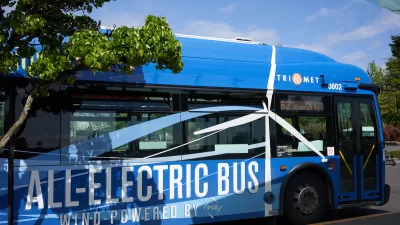To connect the South Waterfront area with the rest of the city, Portland is building a multi-modal bridge accommodating tram lines, streetcars, light rail lines, bicyclists, and pedestrians, but not automobiles.
Portland is yet again pioneering urban planning by building the first multi-modal bridge in the United States that does not allow cars. According to Brian Libby of CityLab, Tilikum Crossing, located in the South Waterfront area, "will carry MAX light rail trains (the impetus for construction) as well as Portland's streetcar line and city buses, and of course pedestrian and bike lanes on both sides—but no cars. If the bridge looks elegant in its slenderness, that may be because the omission of private automobiles keeps it from taking on a more gargantuan array of lanes and entry/exit ramps."
As David Blocher, executive director of capitol projects for TriMet, told Libby, "what makes this one so unique is basically because it's a product of its environment. There's not a road network at either end of it." Blocher continued by saying, "plus, we have this great redevelopment happening on both sides of the river, and we're going to carve it up with freeways on both sides? That's kind of a non-starter."
According to Blocher, Tilikum Crossing reveals the larger narrative "of heretofore mostly industrial waterfronts transitioning to public use; of an industrial economy transitioning to high tech and health care; and of more workers finding alternative means of getting to work."
FULL STORY: Why Portland Is Building a Multi-Modal Bridge That Bans Cars

Alabama: Trump Terminates Settlements for Black Communities Harmed By Raw Sewage
Trump deemed the landmark civil rights agreement “illegal DEI and environmental justice policy.”

Planetizen Federal Action Tracker
A weekly monitor of how Trump’s orders and actions are impacting planners and planning in America.

The 120 Year Old Tiny Home Villages That Sheltered San Francisco’s Earthquake Refugees
More than a century ago, San Francisco mobilized to house thousands of residents displaced by the 1906 earthquake. Could their strategy offer a model for the present?

In Both Crashes and Crime, Public Transportation is Far Safer than Driving
Contrary to popular assumptions, public transportation has far lower crash and crime rates than automobile travel. For safer communities, improve and encourage transit travel.

Report: Zoning Reforms Should Complement Nashville’s Ambitious Transit Plan
Without reform, restrictive zoning codes will limit the impact of the city’s planned transit expansion and could exclude some of the residents who depend on transit the most.

Judge Orders Release of Frozen IRA, IIJA Funding
The decision is a victory for environmental groups who charged that freezing funds for critical infrastructure and disaster response programs caused “real and irreparable harm” to communities.
Urban Design for Planners 1: Software Tools
This six-course series explores essential urban design concepts using open source software and equips planners with the tools they need to participate fully in the urban design process.
Planning for Universal Design
Learn the tools for implementing Universal Design in planning regulations.
Clanton & Associates, Inc.
Jessamine County Fiscal Court
Institute for Housing and Urban Development Studies (IHS)
City of Grandview
Harvard GSD Executive Education
Toledo-Lucas County Plan Commissions
Salt Lake City
NYU Wagner Graduate School of Public Service




























